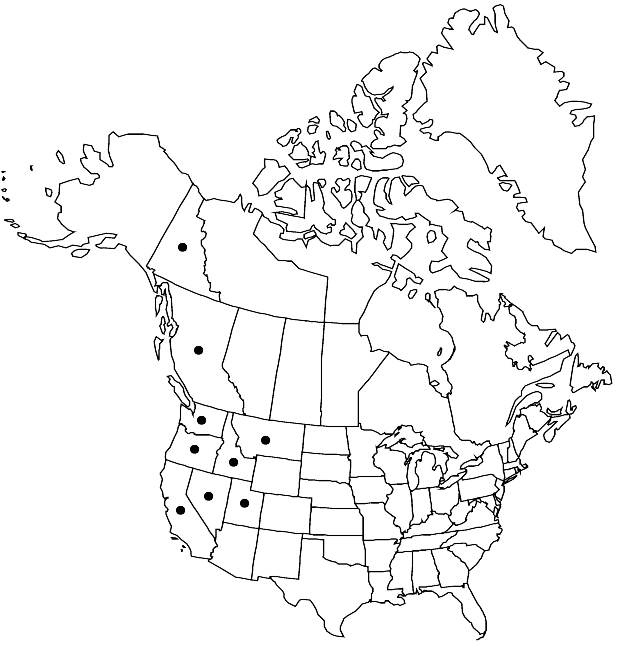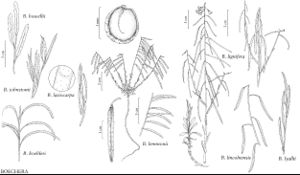Difference between revisions of "Boechera lyallii"
Vasc. Pl. Wyoming ed. 3, 376. 2001.
FNA>Volume Importer |
FNA>Volume Importer |
||
| Line 10: | Line 10: | ||
|name=Arabis lyallii | |name=Arabis lyallii | ||
|authority=S. Watson | |authority=S. Watson | ||
| + | |rank=species | ||
|publication_title=Proc. Amer. Acad. Arts | |publication_title=Proc. Amer. Acad. Arts | ||
|publication_place=11: 122. 1876 | |publication_place=11: 122. 1876 | ||
| Line 16: | Line 17: | ||
|name=Arabis armerifolia | |name=Arabis armerifolia | ||
|authority=Greene | |authority=Greene | ||
| + | |rank=species | ||
}} {{Treatment/ID/Synonym | }} {{Treatment/ID/Synonym | ||
|name=Arabis densa | |name=Arabis densa | ||
|authority=Greene | |authority=Greene | ||
| + | |rank=species | ||
}} {{Treatment/ID/Synonym | }} {{Treatment/ID/Synonym | ||
|name=Arabis drummondii var. alpina | |name=Arabis drummondii var. alpina | ||
|authority=S. Watson | |authority=S. Watson | ||
| + | |rank=variety | ||
}} {{Treatment/ID/Synonym | }} {{Treatment/ID/Synonym | ||
|name=Arabis drummondii var. lyallii | |name=Arabis drummondii var. lyallii | ||
|authority=(S. Watson) Jepson | |authority=(S. Watson) Jepson | ||
| + | |rank=variety | ||
}} {{Treatment/ID/Synonym | }} {{Treatment/ID/Synonym | ||
|name=Arabis multiceps | |name=Arabis multiceps | ||
|authority=G. A. Mulligan | |authority=G. A. Mulligan | ||
| + | |rank=species | ||
}} {{Treatment/ID/Synonym | }} {{Treatment/ID/Synonym | ||
|name=Arabis murrayi | |name=Arabis murrayi | ||
| − | |authority= | + | |authority= |
| + | |rank=species | ||
}} | }} | ||
|hierarchy=Brassicaceae;Brassicaceae tribe Boechereae;Boechera;Boechera lyallii | |hierarchy=Brassicaceae;Brassicaceae tribe Boechereae;Boechera;Boechera lyallii | ||
| Line 55: | Line 62: | ||
-->{{#Taxon: | -->{{#Taxon: | ||
name=Boechera lyallii | name=Boechera lyallii | ||
| − | |||
|authority=(S. Watson) Dorn | |authority=(S. Watson) Dorn | ||
|rank=species | |rank=species | ||
| Line 70: | Line 76: | ||
|publication year=2001 | |publication year=2001 | ||
|special status= | |special status= | ||
| − | |source xml=https://jpend@bitbucket.org/aafc-mbb/fna-data-curation.git/src/ | + | |source xml=https://jpend@bitbucket.org/aafc-mbb/fna-data-curation.git/src/f50eec43f223ca0e34566be0b046453a0960e173/coarse_grained_fna_xml/V7/V7_551.xml |
|tribe=Brassicaceae tribe Boechereae | |tribe=Brassicaceae tribe Boechereae | ||
|genus=Boechera | |genus=Boechera | ||
Revision as of 22:17, 16 December 2019
Perennials; long-lived; (cespitose); sexual or apomictic; caudex woody. Stems usually 1 per caudex branch, arising from center of rosette near ground surface, 0.3–1.5(–2) dm, glabrous throughout. Basal leaves: blade linear-oblanceolate, 1–5(–8) mm wide, margins entire, usually ciliate at least proximally, trichomes (simple and/or short-stalked, 2- or 3-rayed), 0.1–0.3 mm, surfaces (sometimes the entire leaf) usually glabrous or (rarely, the youngest leaves of sterile shoots) pubescent, trichomes 4–6-rayed, 0.05–0.1 mm. Cauline leaves: 1–5, usually not concealing stem; blade auricles 0.5–1.5 mm or, rarely, absent, surfaces glabrous. Racemes 2–10(–15)-flowered, unbranched. Fruiting pedicels erect, straight, 3–8(–15) mm, glabrous. Flowers erect at anthesis; sepals glabrous; petals lavender to purplish, 6–8.5 × 1.5–3 mm, glabrous; pollen ellipsoid or spheroid. Fruits erect, appressed to rachis, not secund, straight, edges parallel, 3–5.6 cm × 1.5–2.5 mm; valves glabrous; ovules 34–64 per ovary; style 0.1–0.7 mm. Seeds biseriate or sub-biseriate, 1.5–2 × 1–1.5 mm; wing continuous, 0.3–0.5 mm wide.
Phenology: Flowering Jun–Aug.
Habitat: Cliffs, talus slopes, gravelly soil in alpine and subalpine habitats
Elevation: 1400-3700 m
Distribution

B.C., Yukon, Calif., Idaho, Mont., Nev., Oreg., Utah, Wash.
Discussion
The taxon traditionally treated as Arabis (Boechera) lyallii var. nubigena is here segregated as B. paupercula (see M. D. Windham and I. A. Al-Shehbaz 2006 for detailed comparison). Completely glabrous individuals of B. lyallii are sometimes confused with B. davidsonii, but they are easily distinguished by the absence of persistent leaf bases on caudex branches, erect and appressed (versus ascending) fruits, and biseriate to sub-biseriate (versus uniseriate) seeds. Both sexual and apomictic collections are known; further study is needed to determine whether they truly are conspecific.
Selected References
None.
